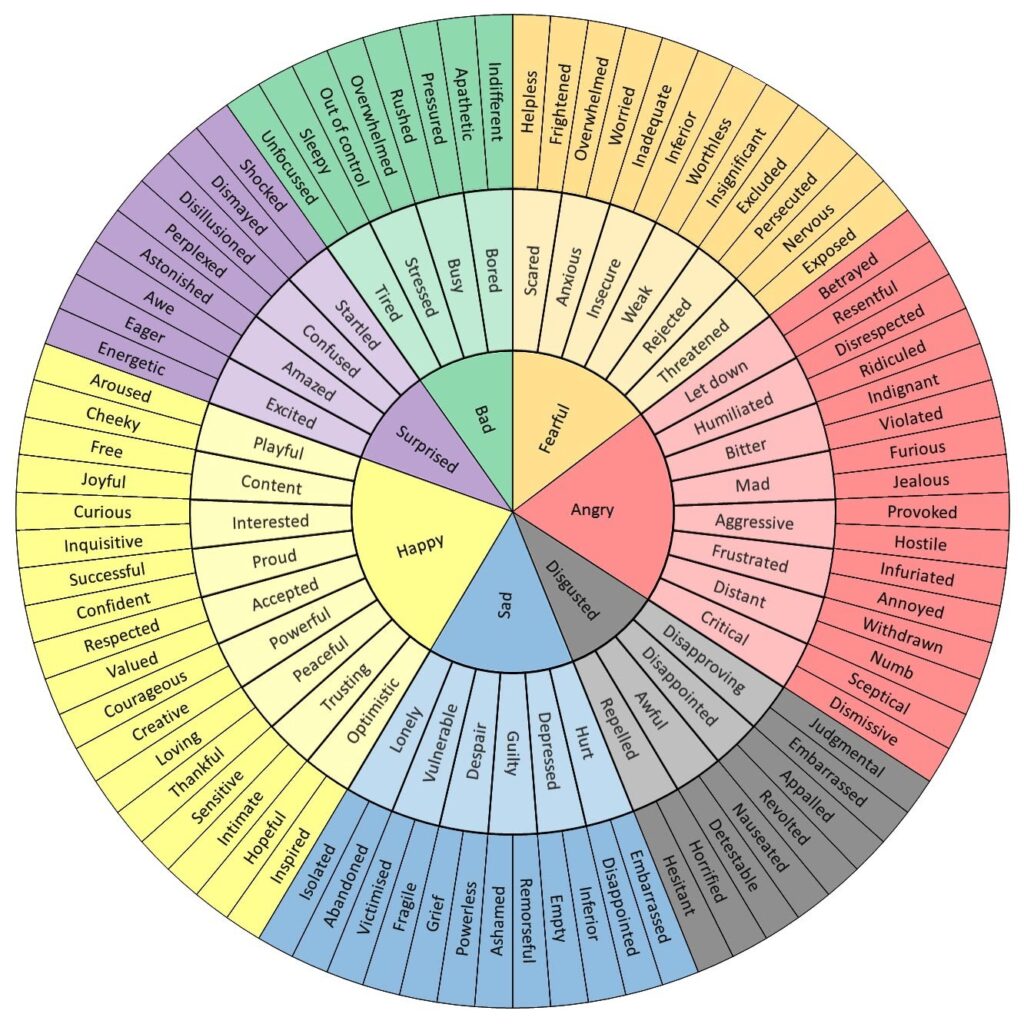Many societies prize the mind over the emotions. As a result, a lot of people (especially those who are socialized as male) have difficulty identifying, naming, and accessing the full spectrum of emotions. Many are so disconnected from their emotional reality they can’t even identify that they’re feeling something, even when their body language indicates they clearly are experiencing some difficult emotion. As sex coaches, we can help our clients navigate the tricky terrain of their hearts through the bodily experience of their emotions.
“How are you feeling about what she just said?” we might ask a client.
“I don’t know. Fine, I guess,” comes the terse reply. Or maybe they just shrug, arms crossed over their body, their face turned away.
What do you do then?
A lot of relationships falter when two or more members of a relationship are unable to communicate on the same level. One person may feel deeply and will try desperately to connect with and understand the other on an emotional level. This type of person tends to get involved with others who are not as emotionally available or aware.
They may ask their partner some variation of these questions:
“Why won’t you talk to me?”
“Please tell me how you feel?”
“Why is your heart so closed off?”
How, then, do we help these clients access their hearts? And why is that important when we’re trying to help them resolve their sexual concerns?
Emotional Impact On Sexuality
At Sex Coach U, we view sexuality as an integral and interconnected aspect of being. In fact, we evaluate and work with clients using the holistic MEBES® Model developed by Dr. Patti, which assesses how sexuality manifests in the five areas of Mind, Energy, Body, Emotions, and Spirit.
When a client is blocked in the realm of their emotions, that block can directly or indirectly influence their sexuality. For example, someone who has trouble expressing their anger may subconsciously redirect that anger into an overly-aggressive approach to sex, which can scare or hurt a partner.
Or someone who is feeling shame but hasn’t learned how to identify or process that emotion may experience erectile or ogasm difficulties, which can then compound the hidden shame and exacerbate those issues. A shame spiral can be quite nasty and hard to break, especially if the person resists the emotional work necessary.
Another person may be struggling with depression, anxiety, stress, or fatigue—all of which can negatively impact their sex life. Some of these effects are due to the power of these emotions to manifest in the body. (Check out this infographic on where emotions are felt most strongly in the body.)
For instance, depression can cause headaches, fatigue, sleep and vision problems, backaches, stomach pain and digestive issues, changes in weight, and a decreased pain tolerance.
First Steps: Identify & Name the Emotion
“How you feel physically is often a map of how you feel emotionally. One of the first steps in regulating emotions is to identify the physical feelings that indicate there’s a strong emotion present. Managing our emotions may start with befriending our bodies.”
Elena Aguilar, author of Onward
The first steps in working with someone who has disconnected from their own emotional body are (1) to identify when they’re feeling something and (2) to name the emotion.
In session, when a discussion fraught with feelings of peril comes up, observe the emotionally closed off person for a moment. Take in all the messages their body is sending, even if their mind is shuttered against those messages.
- Are their arms crossed in front of them? Are their legs clamped firmly together? Are they tapping their toes or heels?
- Is their jaw set? Are they clenching their teeth?
- Is there a vein pulsing in their face? Is their face red? Are their eyes shiny?
- Which way are their feet pointing (are they poised to flee out the door)?
- In what direction is their head turned? How about their body?
- Are their shoulders hunched up around their ears?
- Are they bent over at the waist?
Once you’ve assessed all you can from the body language you can read, start asking them to reflect on their bodily sensations.
“Are you clenching your teeth?”
“Is your stomach tight? Does it hurt? Are you nauseous?”
“Are your shoulders tight?”
You can even describe what you’re observing:
“I see you’re clenching your jaw and crossing your arms over your chest.”
“I’m noticing that your feet are aimed at the door and you’re perched on the edge of your seat.”
“You’ve turned your body away from your partner and you seem to be having trouble making eye contact.”
You can also begin to connect the dots for them. This may require some guessing on your part and some coaxing of your client to get them to reflect on what their body is broadcasting. Sometimes giving voice to the feeling and naming it (even if you’re wrong) can help your client identify what’s actually going on within them.
“I’m noticing your feet are aimed at the door. Does this mean you’re wanting to leave? Does this conversation frustrate you?”
“Your shoulders are hunched up to your ears. Are you trying to block something out?”
“I see you rubbing your chest. Are you feeling scared? Hurt? Sad?”
If you’re an empathic person, you may even start to experience the physical sensations your client is exhibiting, and you could reflect on that.
“I’m feeling a headache all of a sudden, like when I feel depressed or tired. Are you feeling that, too? I wonder if you’re tired of something we’ve been talking about?”
Other Tools for Identifying, Naming, and Processing Emotions
Our clients often don’t have the words to express how they’re feeling, so sometimes using other tools can help here.
Body mapping (also see this resource), emotion wheels, and somatic experiencing are all options for helping to take your clients further, either during a sex coaching session or to empower them to gain greater emotional intelligence on their own.

Credit for the emotion wheel: Geoffrey Roberts at https://m.imgur.com/gallery/tCWChf6
You can also coach your clients on how to perform a body scan meditation. This exercise helps you focus on each area of the body to evaluate what sensations are present in any given moment. This can be a first step to assessing the emotions you may be experiencing.
Finally, if, conversely, a client finds themselves constantly overwhelmed by their emotions (whether or not they can name them), you can guide them in how to ground themselves and their feelings through reconnecting them with their body. These exercises are forms of self-soothing activities to help someone learn to regulate their emotions.
When Is It Time to Refer Out to a Therapist?
All that being said, it’s also important to remember that, as sex coaches, our job isn’t to do deep emotional processing with our clients. If someone is needing to resolve past traumas, or they’re having difficulty regulating emotions (even after doing some of the exercises above), it may be time to refer out to a qualified therapist.
One therapeutic discipline of particular relevance to this area is Emotionally Focused Therapy or Emotionally Focused Couples Therapy. In EFT or EFCT, the therapist has received extensive training in adult attachment theory and in how to address emotional wounds, which will lead the client to a healthier emotional relationship with themselves and their loved ones.
Here is an interesting article on how EFT can be used to help couples resolve sexual difficulties.
As sex coaches, we will often encounter our client’s emotional responses, as well as their bodily sensations, in reaction to our work with them. It’s important to understand how to help your clients identify, name, and begin to process their emotional reality, in order to help them more fully embrace their sexuality. Equally important is recognizing the limits of our training as sex coaches and referring out when necessary. Coaching can be healing and therapeutic, but it is not therapy.
Curious about training to become a Certified Sex Coach™? Join the next live Info Session to meet the SCU team and participate in a live Q&A!

